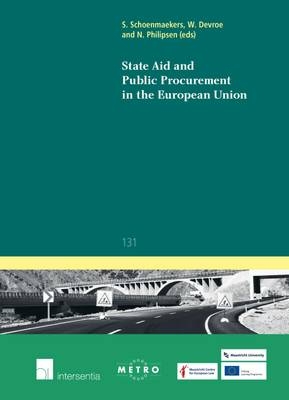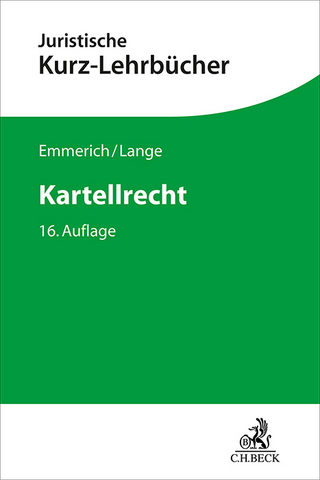
State Aid and Public Procurement in the European Union
Intersentia Ltd (Verlag)
978-1-78068-274-7 (ISBN)
- Titel ist leider vergriffen;
keine Neuauflage - Artikel merken
This book contains a collection of economic and legal essays written by academics and practitioners who contributed to the elective Master's course 'State Aid and Public Procurement in the European Union' at Maastricht University, and to two conferences on State aid and public procurement organised in Maastricht in 2013 and 2014. The course, the conferences and this book aim to provide stakeholders - students, but also academics, practitioners, civil servants, and consumers - with a better knowledge of the EU rules on public procurement and State aid. By treating these two legal fields in one volume, the book also intends to draw attention to the largely unexplored links and interfaces between public procurement and State aid rules, which both aim to complete the internal market and to prevent the distortion of competition. Both fields also share common concepts, and furthermore observance of public procurement rules may limit the risk of individual transactions being qualified as State aid (as the Altmark case law and related Commission packages illustrate).
In 2011, the European Commission's Education, Audiovisual and Culture Executive Agency EACEA recognised the course 'State Aid and Public Procurement in the European Union' as a Jean Monnet European Module (Lifelong Learning Programme).
Sarah Schoenmaekers is an Assistant Professor of European law at Maastricht University, lawyer with Omnius lawyers, a Visiting Professor at the University of Hasselt and a postdoctoral researcher at the Open University of Heerlen. In 2010, she successfully defended her doctoral thesis, "The Regulation of Architects. A Comparative Analysis"', in which the Belgian and Dutch regulations applicable to architects have critically been analysed. She specialised in European law on the four freedoms, more particularly the European diploma-recognition regulations, as well as in public procurement law. She has acted as a project manager of large-scale investigations in relation to European law and publishes in this area. She also publishes in the area of the Belgian architects law. Since 2014 she is a member of the Editorial Board of the Journal "Tijdschrift voor Bouwrecht en Onroerend Goed." Wouter Devroe is a full Professor of Law and Chair of the Economic Law Department at KU Leuven. He is also a full Professor of Competition law at Maastricht University and an expert member ("assessor") of the Belgian national competition authority. His teaching, publications and legal practice focus on EU substantive law, as well as national and EU economic and competition law. As an attorney (Brussels Bar, Allen & Overy LLP), he represents corporate clients before national and EU administrative authorities and courts. He previously clerked at the Court of Justice of the European Union in Luxembourg. Wouter Devroe co-manages the "Ius commune casebooks for the common law of Europe." After graduating in economics (specialisations: microeconomics, antitrust policy) Niels Philipsen started a Ph.D. research in the field of Law and Economics at the Maastricht Institute for Transnational Legal Research (METRO). He obtained his Ph.D. degree in 2003 on the topic "Regulation of and by pharmacists in the Netherlands and Belgium: An economic approach." In 2003 he worked at the European Commission (DG Competition) in Brussels. In 2005 he was a visiting scholar at the University of Illinois in Urbana-Champaign (USA), and in Spring 2007 he was a "European Visiting Professor" at Peking University in Beijing (China). From 2004 to 2006 he was a postdoctoral researcher in the NWO-programme "Shifts in Governance." Since 2007 he has been working as a Senior Researcher in various research projects (including contract research for, inter alia, various ministries, European Commission, OECD, insurers, and professional organizations). He teaches on Law and Economics, competition law and European integration. In 2013 he became Vice-Director of METRO, the Maastricht European Institute for Transnational Legal Research, located at the Faculty of Law.
CONTENTS Preface About the Editors Modernisation of State Aid Rules in the European Union. Application of Economic Concepts and Principles (Doris Hildebrand) 1. Introduction 2. Economic Concepts and Principles in State Aid 2.1. Refined Economic Approach in the 2005 State Aid Action Plan 2.2. 2012 State Aid Modernisation Programme (SAM) 2.3. The Balancing Test 2.3.1. Market Failures 2.3.2. Structure of the Balancing Test 3. Modernised State Aid Guidelines 3.1. 2013 Regional Aid Guidelines 3.2. 2014 Environmental Protection and Energy Guidelines 3.3. Ex Post Evaluations 4. Conclusion References Defining the Scope of State Aid. How Tax Cases Affect the State Aid Framework (Raymond H.C. Luja) 1. Introduction 2. What is the Advantage of Indirect Aid? 3. Do Directives Give Carte Blanche? 4. The GBER as a Procedural Nightmare 5. Ex Officio References by National Judges 5.1. Tax Courts Invoking State Aid 5.2. National Tax Authorities Invoking State Aid in Court 6. How Does an Analytical Taxation of Royalties Fit within the State Aid Framework? 7. Looking Forward: Taxation of Public Enterprises 8. Concluding Remarks Ex Post Evaluation of State Aid (Caroline Buts and Marc Jegers) 1. Introduction 2. The Evolution of Economic Analysis and the Emergence of Ex Post Evaluation in State Aid Control 3. Literature Review 4. Existing Practices and Methodological Guidance 5. Possibilities for Multi-Criteria Analysis 6. Conclusion References The Evolving Treatment of Services of General Economic Interest under EU Law (Wouter Devroe and David Gabathuler) 1. Context 2. What is an SGEI? 2.1. Provision of a Service in the General Interest 2.2. Existence of a Market Failure 2.3. Universal and Compulsory Nature of the Service 3. The Present: Altmark, SGEI Package and Member State Reporting 3.1. Background (Altmark) 3.2. 2011 SGEI Package 3.2.1 'Altmark' Communication 3.2.1.1. Key State Aid Concepts 3.2.1.2. Altmark Criteria 3.2.2. De minimis Regulation 3.2.3. Commission Decision 3.2.4. Framework Communication 3.3. Reporting 4. Sectoral Application of the Rules on SGEI 4.1. Introduction 4.2. Energy 4.2.1. Legal Framework 4.2.2. Commission Practice 4.3. Environment and Waste 5. Conclusion Compensation for the Net Extra Costs of Public Service Obligations (Phedon Nicolaides) 1. Introduction 2. Clarifications: (i) Altmark vs. market economy investor principle, (ii) Altmark vs. compatible State aid, (iii) Altmark vs. Article 106(2) TFEU 3. What Constitutes a Genuine SGEI? 4. Under-Provision by the Market 5. Pre-Determined Parameters of Compensation and No Over-Compensation 6. Conclusions To Procure or Not to Procure? That's the Question! (Sarah Schoenmaekers) 1. The Notion of 'Contracting Authority' 1.1. The Status of (Dutch) Health Insurance Companies 1.2. The Status of (Dutch) Housing Cooperatives 1.2.1. Current Regime 1.2.2. Future Regime 2. Thresholds 3. Conclusion 2014 Procurement Reforms and Bid Rigging: Mixed Blessings or Our Happily Ever After? (Stefan E. Weishaar) 1. Introduction 2. Competition Law and Bid Rigging 2.1. Fines 2.2. Criminal Sanctions 2.3. Public Enforcement 2.4. Private Enforcement 3. Public Procurement and Bid Rigging 3.1. Lowering Bidders' Costs 3.2. Small and Medium-Sized Enterprises 3.3. Deterrence 3.4. Most Economically Advantageous Tenders 4. Conclusion Concessions and Public Procurement (Steven Van Garsse) 1. Introduction 2. The Concept of the Public Works and Services Concession is a Loaded One 3. Concessions versus Public Contracts 4. Written Contract for Pecuniary Interest 5. Execution of Works or Provision of Services 6. Operating Risk 7. The Legal Regime in the New Concessions Directive 8. Closing Considerations EU Green Public Procurement Policy Modernisation Package, Eco-Labelling and Framing Measures (Hanna Schebesta) 1. Introduction 1.1. Environmental Considerations in EU Public Procurement 1.2. Early Case Law Driving the Development of a Green Procurement Policy 2. Green Public Procurement and Directive 2014/24/EU 2.1. Technical Specifications (Article 42, Annex VII) 2.2. Qualitative Selection Criteria (Articles 57 - 64) 2.3. Award Criteria (Articles 67 - 69) 2.4. Contract Performance Criteria (Article 70 - 73) 3. Use of Eco-Labels 3.1. The Dutch Eco-Labels Case in the Light of the Procurement Modernisation Package 3.2. Explaining the New Approach of Directive 2014/24/EU 4. Eco-Labels and their Significance for Green Public Procurement 4.1. Content Level Considerations 4.2. Governance and Legitimacy 4.3. Influence of Public Procurement on Private Purchases 5. EU Green Public Procurement Framing Measures 5.1. Analysis of the Framing Measures Transparency Obligations for Parking Services (Len Broeders) 1. Introduction 2. History 3. The Court of Justice and the Transparency Obligation 4. The Judicial Procedure in the Netherlands 5. Conclusion
| Erscheint lt. Verlag | 16.10.2014 |
|---|---|
| Verlagsort | Cambridge |
| Sprache | englisch |
| Maße | 165 x 240 mm |
| Gewicht | 300 g |
| Themenwelt | Recht / Steuern ► EU / Internationales Recht |
| Recht / Steuern ► Wirtschaftsrecht ► Wettbewerbsrecht | |
| ISBN-10 | 1-78068-274-3 / 1780682743 |
| ISBN-13 | 978-1-78068-274-7 / 9781780682747 |
| Zustand | Neuware |
| Haben Sie eine Frage zum Produkt? |
aus dem Bereich


